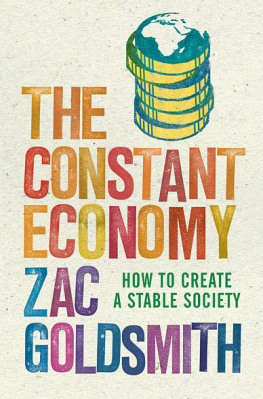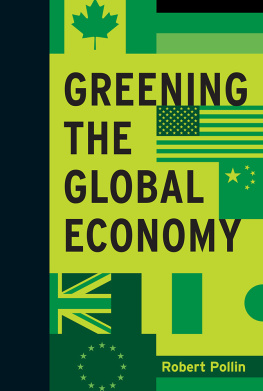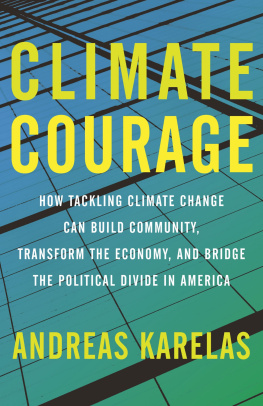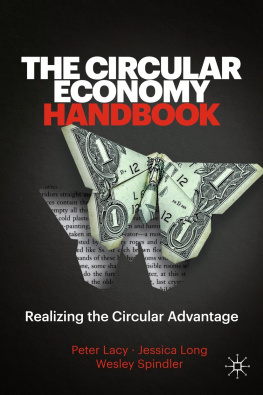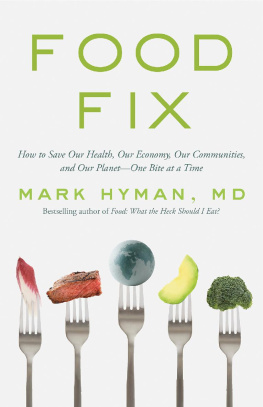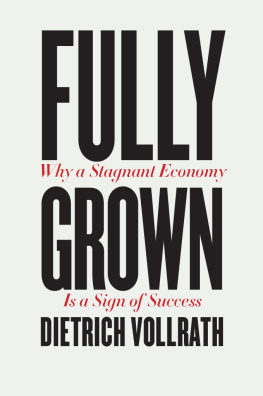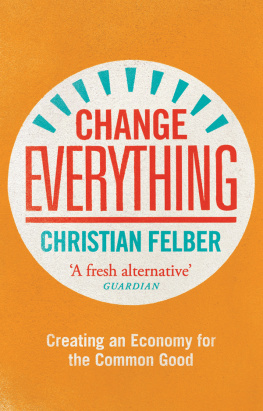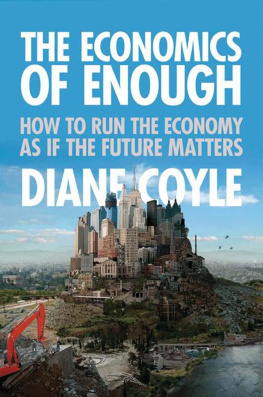THE CONSTANT ECONOMY
Born in 1975, Zac Goldsmith joined the Ecologist magazine in 1997 and became its editor. In 2004 he received Mikhail Gorbachev's Global Green Award for 'International Environmental Leadership'. He is now the Conservative prospective parliamentary candidate for Richmond Park in London.
THE CONSTANT ECONOMY
How to Create A Stable Society
Zac Goldsmith

Atlantic Books
London
First published in Great Britain in hardback and airport and export trade
paperback in 2009 by Atlantic Books, an imprint of Grove Atlantic Ltd.
This electronic edition published in Great Britain in 2009 by Atlantic Books
Copyright Ecology Grants Limited, 2009
The moral right of Zac Goldsmith to be identified as the author
of this work has been asserted by him in accordance with the Copyright,
Designs and Patents Act of 1988.
All rights reserved. No part of this publication may be reproduced,
stored in aretrieval system, or transmitted in any form or by any
means, electronic, mechanical, photocopying, recording, or otherwise,
without the prior permission of both the copyright owner and the
above publisher of this book.
Every effort has been made to trace or contact all copyright-holders.
The publishers will be pleased to make good any omissions or rectify any
mistakes brought to their attention at the earliest opportunity.
1 3 5 7 9 10 8 6 4 2
A CIP catalogue record for this book is available from the British Library.
ISBN: 978 1 84887 396 4
Atlantic Books
An imprint of Grove Atlantic Ltd Ormond House
2627 Boswell Street
London WC1N 3JZ
www.atlantic-books.co.uk
For Uma, Thyra and James
Contents
Preface
The first British election fought on environmental issues was hardly an extravagant affair. It didn't capture the imagination of the public or the world media, nor was it fought by a recognizable political party. Yet in terms of the development and progress of green politics, it was a key event even if the unlikely battleground was Suffolk.
In 1974, the global environment was, at best, a marginal concern. And in one of the most keenly contested general elections of the twentieth century, the second in the same year, it was going to take something startling for green issues to be taken seriously. My uncle Teddy founder of the Ecologist magazine and member of 'People', which eventually became the Green Party helped draw up a stark manifesto based around his magazine's Blueprint for Survival. It was obvious to him that he would need something more than mere argument, or even the snappy line 'No deserts in Suffolk. Vote Goldsmith' to attract people's attention. He needed a camel.
Teddy managed to find one, and it provided much-needed colour in an otherwise greyish political climate. As a stunt, however, it failed to pull in the voters, and Teddy to no one's surprise lost his deposit in style. Not only that, but a paper-waving official accused him of animal cruelty, citing the effects on the camel of breathing in car fumes. 'That's exactly my point,' Teddy declared. 'Imagine what it's doing to us!'
Thirty-five years later and there has been a seismic shift. Green concerns have moved from the fringes of political debate into the mainstream of government. But despite this progress, there remains an almighty gulf between what is said and what is done. Tony Blair, for instance, described climate change as 'the greatest long-term threat to our planet'. 'Inaction', he said, would be 'literally disastrous'. In charge for a decade, Blair had presided over a country that became neither less polluting, nor more prepared for environmental change.
There are nevertheless patches of good news from the world of politics many of which are mentioned in the course of this book. The trouble is that most of them address only one, albeit immense symptom of the environmental crisis: climate change. They do little to address the fact that we are rapidly shifting from an era of abundance towards one of scarcity a situation caused by a combination of massive population growth, an insatiable human appetite for consumption and an ever-shrinking resource base.
This might seem like a nightmarish vision of the future, but it is, in fact, a mathematical certainty. We cannot continue to consume the world's resources at the rate we are, without expecting them to run out at some point. But that very basic truth has almost no bearing on policy decisions. Governments shy away from tackling the issue, terrified of antagonizing voters with unpopular policies. The underlying assumption is that there is a straight choice between economy and ecology and, ultimately, the economy always wins. But it's a false choice.
The recession has already cost many people their jobs, their savings and even their homes. In such times, concern for the environment necessarily slips down the agenda. But the right environmental solutions would help, not hinder people struggling to cope. And when we emerge, as we know we will, we can do so with an economy that is environmentally literate, where green choices that are currently available only to the wealthy become available to all.
Now is the time to decide what sort of economy we want to develop from the ashes of this recession. Instead of struggling to recreate the conditions that delivered it, we can choose to stimulate the development of a cleaner, greener and much less wasteful economy. We can build something new, something that will regenerate our stagnant economies, and which, unlike the growth model that has dominated for decades, can actually last. We ignored economists' warnings that we were living beyond our financial means. We cannot continue to ignore scientific warnings that we have been delving into nature's capital for too long. As one US conservationist has cautioned, 'Mother Nature doesn't do bailouts.'
Critics of the environmental agenda claim the cost of a green economy would be hundreds of billions, if not trillions of pounds. But they confuse cost with investment. For example, if I invest one hundred units in improving the energy efficiency of my local school, and save twenty units each year thereafter as a result, that represents a hugely rewarding investment opportunity. And the shift doesn't require 'new' money.
There should be no need for net tax increases to pay for our indulgence in things green. It simply requires bullish signals from government. If a proper cost is attached to pollution and waste, businesses will minimize both. And if the funds raised from taxing these activities are used to incentivize the opposite, we will see a dramatic shift in the movement of money towards the kinds of investments and activities that we need. With the right encouragements, whole sectors could flip. UK pension funds, for instance, control about 860 billion. Imagine the impact if they chose to invest it in the new green economy?
But it's not just the way that we invest that needs to be addressed, it's the way that we look at costs. As a young child, I would pilfer ice cream from my mother's kitchen and sell it at knock-down rates to passers-by on the streets outside my home. The cash tin overflowed, and I was delighted. With zero capital costs on the balance sheet, I'd turned, relatively speaking, an enormous profit. It was only when my clandestine enterprise was uncovered that I was forced to confront the subsidies my parents had unwittingly provided and discovered that I had, in fact, made a substantial loss. If polluting industries had to pay for the clean-up, they would see a similar effect on their balance sheets

